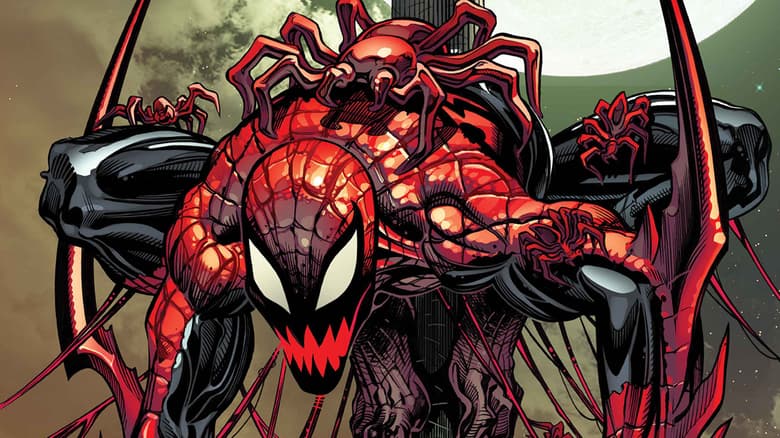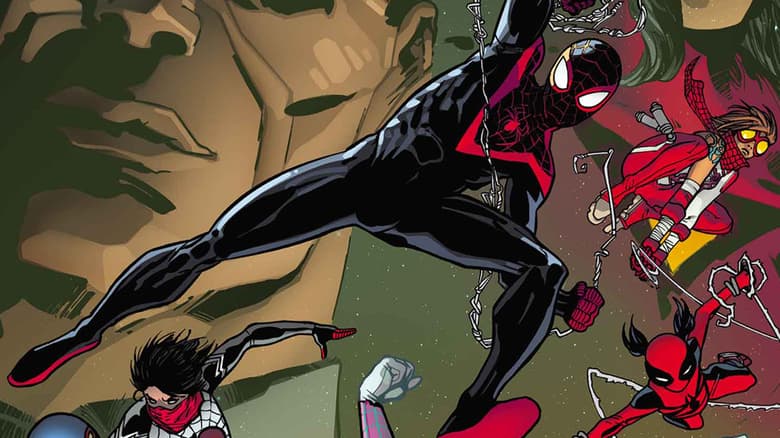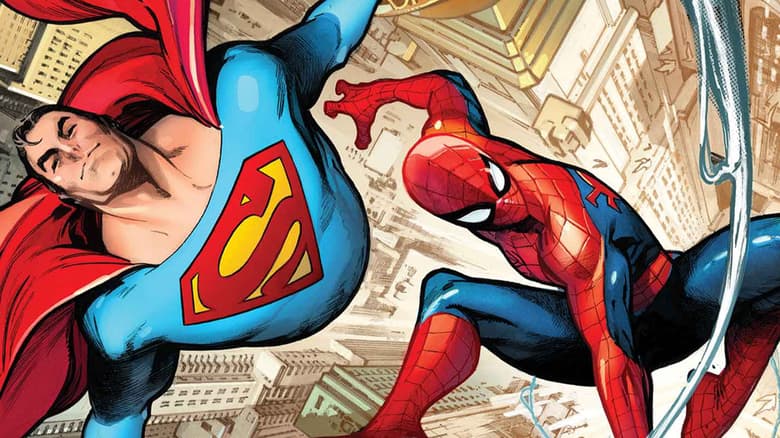The Life and Times of Gwen Stacy
Who was Gwen Stacy before she was Ghost Spider?
After spending several years as a supporting character for Peter Parker, Gwen Stacy is finally getting her moment as a hero in her own right. As Spider-Gwen, now Ghost Spider, she’s going to be in two new cartoon series in addition to her own comics, including SPIDER-GWEN: GHOST SPIDER by Seanan McGuire, the first issue of which is available now. But who is, or was, Gwen Stacy and what does she have to do with Peter Parker in the first place? It is, as always, complicated.
To begin at the beginning, let’s go back to the year 1965 when Peter Parker was starting as a freshman at Empire State University...
A Date with Destiny
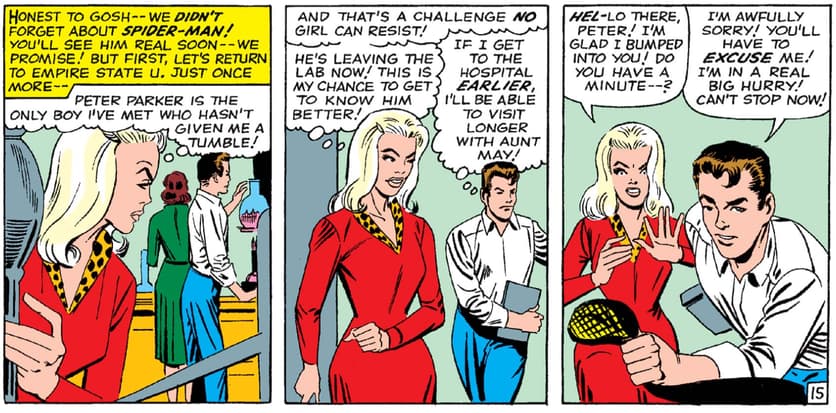
The first issue Gwen Stacy was seen in was called, aptly enough, “If This Be My Destiny” (AMAZING SPIDER-MAN #31) – and her destiny would be great indeed. When Gwen Stacy first hit the scene at the beginning of the iconic Silver Age story the “Master Planner Trilogy” in AMAZING SPIDER-MAN #31, the girl Flash Thompson introduced to Peter Parker was a bit different from the kind, sweet Gwen we all know and love. As the writers ironed out her personality, Gwen was portrayed as an icy queen bee-type, almost prototypical of Emma Frost sans the super-powered complexity. Oddly enough in a subversion of expectations, in her first appearance Gwen is very attracted to the dorky Peter right off the bat with Peter as the one to blow her off (because of how distracted and upset he was about his Aunt May’s illness at the time). It didn’t take long for Gwen to find her lasting voice, however, after the Steve Ditko era of her characterization. In time, Peter became closer to Gwen and they began to date. Incidentally, this was right around the time he also met Anna Watson’s niece Mary Jane, but MJ and Peter were pretty much just friends back then.
Peter and Gwen’s relationship was rocky at times, chiefly because of his keeping his identity as Spider-Man secret from her and often running off without explanation to fight crime. Gwen’s father, Police Captain George Stacy, was a great ally of Spider-Man and strongly approved of Peter and Gwen’s relationship. Everything changed, however, when Captain Stacy died. In AMAZING SPIDER-MAN #90, “And Death Shall Come”, George died heroically saving a child from the falling debris of a Spider-Man/Doctor Octopus battle. This marked the second time after Uncle Ben that Peter inadvertently caused the death of someone he cared about, though this time instead of shirking responsibility it was while trying to save the day (possibly foreshadowing the tragic fate of Gwen). With his dying breath, the captain revealed that he had known Spider-Man’s secret identity as Peter Parker all along, and asked him to take care of Gwen for him.
The death of Captain Stacy was the beginning of the end of his daughter in many ways. The aftermath of his death would lead Gwen down a dark path of hatred, blaming Spider-Man for her father’s death and thus destroying her relationship with Peter as he struggled to love a girl who hated his alter ego. In the end, George Stacy’s last wish would be twisted cruelly by fate, as the very thing Spider-Man vowed to him would end up killing Gwen.
The Night Gwen Stacy Changed Comics
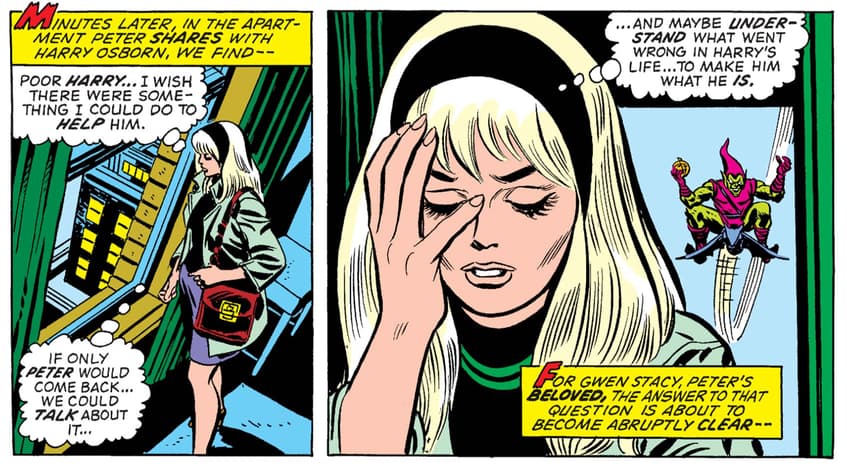
Gwen Stacy died on a dark night in 1973 (AMAZING SPIDER-MAN #121-#122) when the Green Goblin aka Norman Osborn hurled her off of the George Washington Bridge. His reasons were the usual fare: make Spider-Man suffer for constantly foiling his dastardly plans. At this point Norman also knew that Spidey and Peter Parker were one and the same, thus doubling his revenge since he also blamed Peter for not doing more to help his son Harry Osborn (Pete’s best friend) with his drug problems. The “Sins Past” storyline in 2004 would later add more nuance to the event with flashbacks to an illicit affair between Gwen and Norman resulting in twin babies delivered in secret shortly before her death, painting the narrative that Norman killed Gwen to gain full custody of his children especially in light of his strained relationship with Harry. But “The Night Gwen Stacy Died” was already a total Grecian tragedy in its original telling; although Spider-Man caught the falling Gwen by her leg with his web, the sudden stop in midair caused her neck to snap. The scene is made even more heart-wrenching by the fact that Peter thinks he’s saved her at first, and only after a few moments realizes what has transpired.
Gwen is the third act in a brilliant progression for Peter – his Uncle Ben is killed because of Peter’s own moral negligence, next Captain Stacy dies indirectly from Peter’s valiant attempt to be “good,” and now Gwen has been killed however accidentally by his very own hand as he tries to save her from the inexorable destiny that loving him condemned her to. It’s all that Peter can do to stop himself from murdering the Goblin in revenge right then and there, a dark and sudden turn for the previously lighthearted and just Spider-Man.
This event was not only a landmark moment for refreshingly scientific realism in Super Hero comics, but also a turning point for the comics landscape as a whole. For the first time, a major innocent supporting character, let alone a seemingly endgame love interest, had died in such an abrupt and heartbreaking way. An age of innocence came to a close that sad night on the George Washington Bridge. At the time, intense controversy was stirred, but history was made all the same. The arc pushed the bounds of the kinds of depth and scope Super Hero stories were capable of and cemented Spider-Man as one of the most organically thought-provoking and layered heroes in comic book history.
In time Peter would work through his grief alongside growing feelings for Mary Jane. He would graduate from college, keep saving the day (albeit with a slightly more wary and careful tone under the bravado), and the world would keep spinning without Gwen living on it. That is, until the Jackal appeared.
Send in the Clones

Amidst the chaotic aftermath of Gwen’s death it was revealed that one of her teachers at Empire State University, one Professor Miles Warren, was obsessively infatuated with her. It didn’t take long after her demise for him to take on the deranged villainous identity of the Jackal. And, just like the late object of his affection, he put all of his grief and blame on Spider-Man and got to work battling Spidey in misplaced vengeance. Set two years after her death, the Jackal finally succeeded in viably cloning Gwen Stacy in 1975’s AMAZING SPIDER-MAN #144-#149.
Of course, this turn of events couldn’t have come at a more inopportune time – Peter and Mary Jane had gotten very serious by this point, forcing Peter to choose between the girl whose death shattered him and the girl who put him back together again. Realizing that he’s a different person in a different place than when he had been with Gwen, Peter chooses Mary Jane. Issue #149 ends with Peter closing the door to MJ’s house behind him and with it the door to any doubt or conflict he might have had left over his newer relationship. SPIDER-MAN: BLUE (2002-2003) does a great job of portraying the nuanced nature of Peter and Mary Jane’s relationship after Gwen’s death. As Peter talks into a recorder about missing Gwen on Valentine’s Day, his now-wife Mary Jane overhears and tells Peter to say hello to Gwen for her because she misses her friend very much, too; this cements the idea that Peter will always have been in love with Gwen, even if he isn’t now, and Mary Jane understood that. It was no one’s fault, and it might not have felt “fair” to the clones, reconstitutions, or in any other way approximations of Gwen Stacy to come, but it’s just the way things worked out to be.
The Gwen clone leaves New York, not to return until the ‘90s “Clone Saga.” This initial cloning storyline opened the doors to many other instances of cloned Gwens. AMAZING SPIDER-MAN #144 (1975) revealed that there was another clone previously unknown to Spider-Man and company living under the name of Joyce Delaney in London (who is promptly murdered by yet another Gwen clone going by Abby-L.) Another clone appears in THE AMAZING SPIDER-MAN #399 (1995), though she dies from clone degeneration in the next installation of the story arc depicted later that same year in SPIDER-MAN #56. A crossover story between SUPERIOR SPIDER-MAN TEAM-UP and SCARLET SPIDER introduced another clone, this one loyal to the Jackal, and she dies in a lab fire soon after. The most recent appearance of a clone Gwen was in the 2016-2017 “Dead No More: The Clone Conspiracy” story arc which introduces a genetic reconstitution of Gwen which Jackal won’t call a clone but, hey, it’s kind of a clone (though one with all of her memories, even that of her death). While the “clone” Gwen degenerates to dust, this story also features an alternate universe fan-favorite Gwen from Earth-65 codename Spider-Woman. And as for her... well, let’s just say that it’s kind of a long story.
Alternatively-Speaking
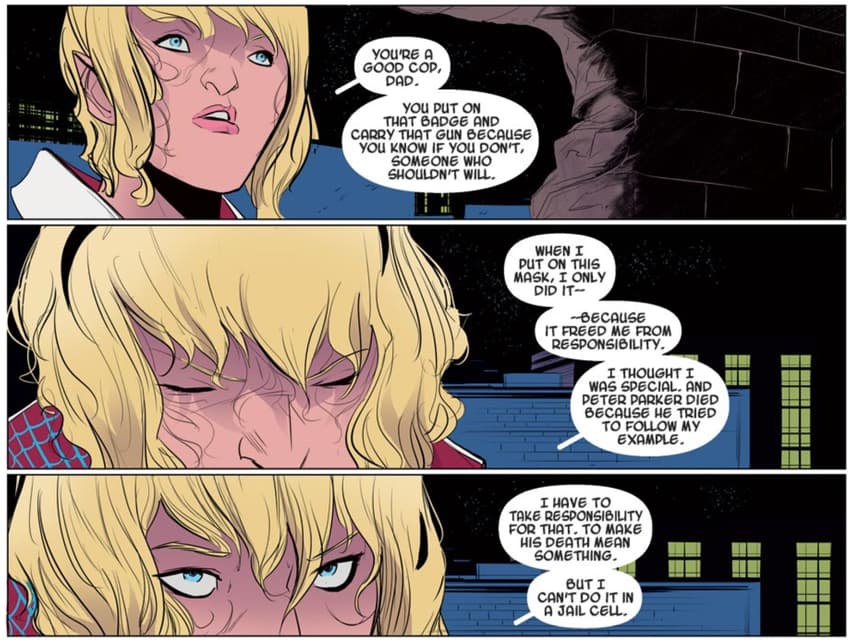
There are many “What If” issues about what the Marvel Universe would be like if Gwen hadn’t died on that bridge. There are issues asking and answering that question with “What If Gwen Stacy Had Lived?”, “What if Spider-Man Had Kept His Six Arms?”, “What If: The Other” (where Peter Parker resurrects Gwen with the Venom symbiote), and “What if Peter Parker became the Punisher?”
A mashup of Gwen Stacy and Deadpool was also created for a variant cover in 2015. The character design was received so well that two stories were produced featuring this newly re-imagined Gwenpool, but a HOWARD THE DUCK backup story called “Gwenpool Holiday Special #1” noted that this character is not actually Gwen Stacy or an alternate/clone of her at all, but actually just a woman named “Gwen Poole” and that the whole thing is a big misunderstanding. This retcon is supported by the ongoing series THE UNBELIEVABLE GWENPOOL, citing that apparently more than one person can be named Gwen in one universe – go figure!
The most well-known alternate timeline stories are probably SPIDER-MAN: HOUSE OF M (2005), wherein Scarlet Witch alters reality to create an alternate timeline where, among other things, Gwen Stacy was never killed, eventually married Peter, and the couple had a young son, and EDGE OF THE SPIDER-VERSE #2 (2014) where Gwen was the one to get bitten by a radioactive spider and develop spider powers instead of Peter. In fact, Peter Parker died in that reality and Gwen felt responsible for it. Going by the name Spider-Woman, nicknamed Spider-Gwen by the writers and fans of the character, this Earth-65 Gwen Stacy was a member of Mary Jane Watson’s rock band (The Mary Janes) and fought crime with wise-cracking wit to rival Earth-616’s Peter. The character became wildly popular by the Marvel team and readers alike, so after the events of the Spider-Verse arc, Gwen got her own solo series, SPIDER-GWEN. Her most recent appearance is in the brand-new “Marvel Rising” film franchise, where she adopted the new name, Ghost-Spider!
Which brings us all up to date, just in time for… Spider-Geddon and SPIDER-GWEN: GHOST SPIDER #1, written by Seanan McGuire with art by Rosi Kämpe! Available now, either online or at your local comic shop!
The Daily Bugle
Can’t-miss news and updates from across the Marvel Universe!





